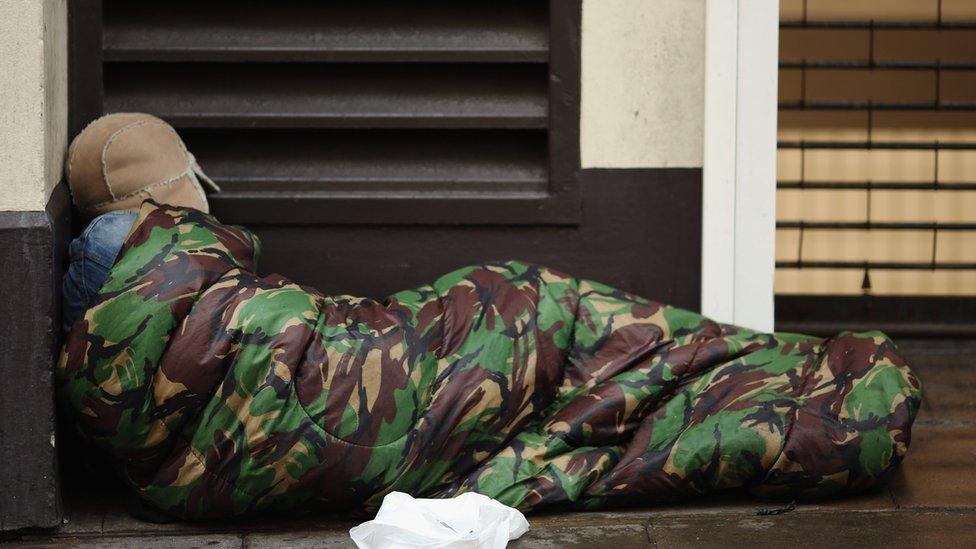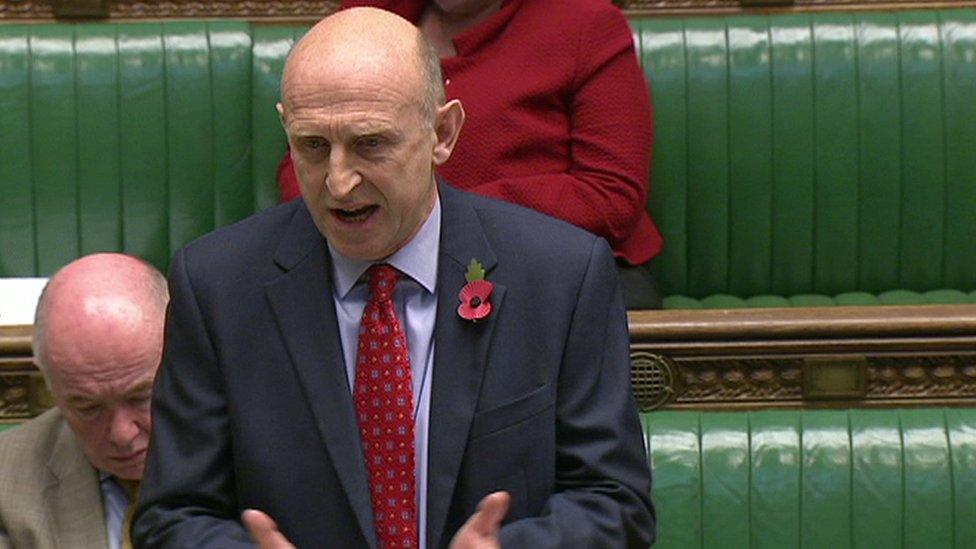Ministers pledge to meet costs of homelessness bill
- Published

Homelessness has increased in recent years, with 2016 seeing a 4% rise in the number of households needing help to avoid it.
The government has pledged its "full and unfettered" support for a bill that would force councils in England to do more to tackle homelessness.
Bob Blackman MP said it was a "national disgrace" that a single person should have to sleep rough.
His private member's bill aims to reform the law to make sure more people get help before losing their home.
A former housing minister had warned that councils would need more funding to fulfil the commitment.
As-it-happened: Homelessness debate
The well-attended debate saw MPs from different parties broadly support the private member's bill.
It passed its first Parliamentary hurdle in the Commons on Friday when it was approved by MPs without any votes against it. The Homelessness Reduction Bill will now go forward for detailed scrutiny.

John Healey raised concerns over councils' ability to build more housing.
Communities and Local Government Minister Marcus Jones reiterated the government's "full and unfettered support" for the Homelessness Reduction Bill, adding that the government would fund the extra costs to councils arising from the changes it proposes.
Conservative MP Mr Blackman's bill amends the 1996 Housing Act to change the definition of being "threatened with homelessness", obliging councils to assess people at risk of homelessness at an earlier stage.
Currently the threat of homelessness is defined as beginning 28 days before a person is likely to become homeless.
The bill would extend that period to 56 days, giving people longer to seek help from their local authority.
Housing lists
It would also oblige councils to offer support in finding accommodation for people who become homeless for a further 56 days.
The categories of people eligible for council support would also be expanded, in a move away from the current focus on "priority housing lists" based on applicants' vulnerabilities.
Harrow East MP Mr Blackman called for a "culture change in councils", moving their priorities from "crisis management" to a pro-active approach in preventing homelessness.
He said he had looked at the experience of the Welsh Assembly, which introduced similar measures in 2015 and had since seen a 69% reduction in the number of households receiving homelessness duty.
'Lack of housing'
For Labour, shadow housing secretary John Healey called for more government support for local authorities, saying: "If ministers mean what they say about homelessness, they must do two things: fund the costs of the extra duties in this bill in full, and tackle the causes of the homelessness crisis in this country."
Conservative former housing minister Mark Prisk said there "will be the need, when required, for additional funding for many councils in order for them to fulfil that commitment".
Labour's Stephen Pound said that in many cases local authorities were simply unable to house homeless people, saying that "councils don't lack empathy, they lack housing."
'Major step'
Chairman of the Local Government Association Lord Porter echoed concerns over a lack of housing, saying: "It is clear that legislative change alone will not resolve homelessness.
"If we are all to succeed, then all new duties proposed in the bill will need to be fully funded. Councils need powers to resume our role as a major builder of affordable homes."
Homelessness charity St Mungo's, which had encouraged MPs to support the bill, said it would "fill a gap in legislation that means many people get little or no support to avoid the dangers of sleeping rough".
The charity's Executive Director of Strategy and Policy Dominic Williamson said: "If the Homelessness Reduction Bill becomes law, it will be a major step towards ensuring help to prevent and tackle homelessness is available to everyone. "
- Published31 January 2012
